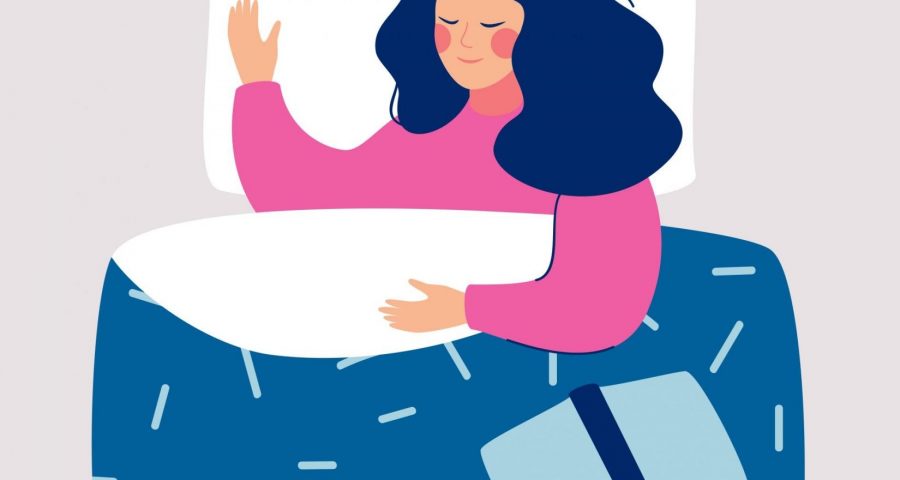These days, many of us complain of being tired and/or bloated, but what if the two are connected? Gassy writer and runner Lisa Bowman explores the link between our gut and sleep, discovering that the two are more intertwined than we may have thought.
Have you ever gone to bed constipated or with a full stomach and woken up the next day feeling groggy and unrested? You’re not alone. I definitely notice that I have weird dreams and restless sleep when I’ve hit the sack unable to empty my bowels properly, or when I’ve eaten late because of an evening yoga class.
“Our gut health is directly linked to our brain through a connection known as the gut-brain axis, so it’s no surprise that gut health can often determine sleep quality,” says Abi Roberts, sports nutritionist at The Gut Co.
You may also like
Gut health can be impacted by physical injury, as well as mental health
“Thriving gut bacteria has been linked to better sleep quality, whereas bad gut bacteria is linked to poor sleep.”
Why is this? Our digestive tracts are full of over 100 trillion microorganisms – known collectively as microbiota – which can be both beneficial and harmful. Their role is complex, but studies show they can affect heart health, metabolism and mental health.
We already know that mental health issues like anxiety and depression can, of course, throw off our usual sleeping patterns. One school of thought is that gut microbiome dysbiosis causes inflammation that can affect the central nervous system, thus aggravating mental health issues like depression or insomnia.
“Microbes produce a variety of neurotransmitters such as serotonin, gamma-aminobutyric acid (GABA) and melatonin that travel to the brain via the gut-brain axis, modulating emotions and sleep,” explains nutritionist and gut health specialist Marilia Chamon.
“The body’s biological clock works in synergy with the microbial clock and recent studies show that circadian rhythm disruption changes gut bacteria composition in a negative way.”
What’s even more interesting is that the gut-sleep link is bidirectional, in a potentially vicious cycle of poor gut health affecting sleep, and poor sleep affecting gut health. In fact, studies have shown that sleeping too little or too long can trigger constipation, so it’s important to find your body’s sweet spot of rest.
GUT HEALTH AND CIRCADIAN RHYTHM
We humans all have our own individual circadian rhythms that regulate the sleep-wake cycle, explaining why some of us are early birds and some night owls.Studies now show that intestinal microbiota have their own circadian rhythms – but how does this affect us?
“Meal timing and eating windows are now emerging to be just as important as the composition of our diets in maintaining microbiome rhythmicity,” advises Chamon.
“While most research has been conducted in mice, it shows that the composition of our gut microbiota fluctuates in response to food ingested during waking/eating times and sleeping/fasting times. This means that periods of fasting are critical, to ensure that certain bacteria are not outcompeted by others that thrive during eating times.
“A regular eating schedule during the day is something we can easily implement to improve gut microbiota health, while eating late at night should be avoided – especially junk food. A study, published in the journal Microorganisms, conducted on mice found alcohol and fast food consumption at night disrupts gut microbiota rhythmicity.”
EXERCISE AND OUR INTESTINES
While research has shown that regular, moderate exercise can increase the number of healthy bacteria in our gut, it’s thought that intensive, prolonged exercise can cause growth of bacteria that causes inflammation in the digestive system.
This could help explain ‘runner’s gut’ – an estimated 30-90% of distance runners experience gastrointestinal issues (GI) brought on by exercise, eg diarrhoea, abdominal pain and nausea. Intensive exercise can also cause decreased blood flow in the mesenteric artery (which supplies the pancreas and parts of the small and large intestine), a reduction in oesophageal peristalsis (how food is sent into the stomach from the oesophagus), and a slowing down of food entering the small intestine from the stomach. Lest we forget that dehydration from sweating can trigger constipation. It’s a lot to think about.
HOW CAN WE IMPROVE OUR GUT-SLEEP HEALTH?
“The best course of action to take when suffering with both GI issues during exercise and poor sleep is to improve your approach to both gut health and sleep hygiene,” advises Roberts.
“Taking a probiotic supplement, consuming plenty of fruits, vegetables, and whole foods, identifying trigger foods, ensuring you are hydrated before exercise, as well as following sleep hygiene principles – such as sticking to a bedtime routine, avoiding big meals at night, and winding down before sleeping – can all contribute to overall better gut health and improved sleep quality.”
Chamon recommends focusing on your diet before taking supplements: “Supplements have a time and place to be taken (and can be extremely beneficial), but eating a varied diet is the most effective way of re-establishing gut bacteria balance.
“We can find both probiotics and prebiotics in a wide range of foods. Anything fermented and with live cultures is rich in probiotics – foods like sauerkraut, kefir, kimchi. Prebiotics are a type of dietary fibre and can be found in many plant foods, like onion, garlic, leek and asparagus.”
Make sure you also leave enough time between eating and exercising, so your body can concentrate on digesting before it needs to concentrate its energy on your sweat sesh. The NHS recommends waiting three hours after eating a main meal, and an hour after a light snack.
“Keep in mind many other factors can contribute to sleep disturbances,” adds Chamon.
“These include hormonal imbalances, nutritional deficiencies, chronic inflammation, and blood sugar dysregulation, to name a few.”
Of course, if you’re worried about your sleep or digestive health, it’s best to speak to your GP.
For more of the gut stuff, visit the Strong Women Training Club.
Images: Getty
Source: Read Full Article
